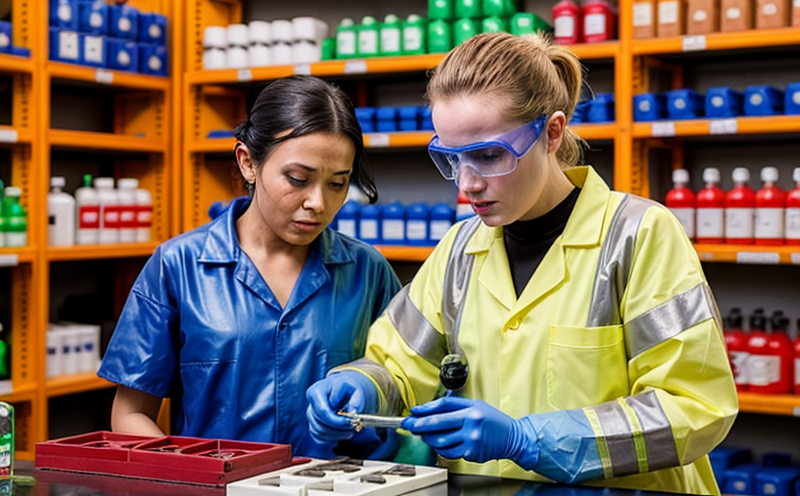ASTM D5839 Mercury Content Testing in Imported Chemicals
The ASTM D5839 standard is a critical tool for ensuring the safety and compliance of imported chemicals, especially those used in sensitive applications where even trace levels of mercury can pose significant risks. This service focuses on providing accurate and reliable testing to detect mercury content in imported chemicals as per the requirements specified by this international standard.
ASTM D5839 is designed for measuring total mercury content in liquid petroleum products, which includes a wide range of materials used across various industries such as petrochemicals, pharmaceuticals, and environmental remediation. The test protocol outlined in ASTM D5839 ensures that imported chemicals are free from excessive levels of mercury, thereby protecting public health and the environment.
The testing process begins with careful sample preparation to ensure accurate results. This involves diluting the chemical samples as necessary and ensuring they are representative of the batch being tested. The use of precision analytical instruments such as atomic absorption spectrophotometers (AAS) and inductively coupled plasma mass spectrometers (ICP-MS) is essential for detecting trace levels of mercury.
The acceptance criteria for ASTM D5839 testing are stringent, ensuring that any detected mercury content falls well below the permissible limits specified by regulatory bodies. This service not only adheres to these standards but also offers insights into how these tests can be integrated into a broader quality control and compliance framework within government agencies and trade facilitation organizations.
Understanding the significance of ASTM D5839 in the context of imported chemicals is crucial for stakeholders involved in global trade. By ensuring that only compliant materials enter the supply chain, this service plays a pivotal role in maintaining the integrity and safety of international chemical markets. The following table provides an overview of some key applied standards relevant to ASTM D5839:
| Standard | Description |
|---|---|
| ASTM D5839-17 | Test Method for Determination of Total Mercury in Liquid Petroleum Products. |
| ISO 16203:2016 | Determination of total mercury content by cold vapor atomic absorption spectrometry (CVAAS). |
| EN ISO 17835-4:2019 | Methods for the determination of trace elements in petroleum products - Part 4: Mercury. |
The testing process is not only about compliance but also about providing actionable insights to our clients. Our team of experienced chemists and engineers works closely with stakeholders to ensure that every test result is interpreted accurately, offering recommendations for corrective actions if necessary.
Applied Standards
The ASTM D5839 standard is widely recognized as one of the most comprehensive methods for determining total mercury content in liquid petroleum products. This table provides an overview of some key applied standards relevant to ASTM D5839:
| Standard | Description |
|---|---|
| ASTM D5839-17 | Test Method for Determination of Total Mercury in Liquid Petroleum Products. |
| ISO 16203:2016 | Determination of total mercury content by cold vapor atomic absorption spectrometry (CVAAS). |
| EN ISO 17835-4:2019 | Methods for the determination of trace elements in petroleum products - Part 4: Mercury. |
The use of these standards ensures that our testing methods are accurate, reliable, and consistent with international best practices. This is particularly important given the global nature of chemical trade and the need to harmonize testing protocols across different regions.
Eurolab Advantages
At Eurolab, we pride ourselves on offering a comprehensive suite of services that meet the highest standards of accuracy and reliability. Our team of experts is dedicated to ensuring that every test conducted meets or exceeds the requirements set forth by ASTM D5839.
- State-of-the-art equipment: We utilize cutting-edge instruments such as atomic absorption spectrophotometers (AAS) and inductively coupled plasma mass spectrometers (ICP-MS), which are essential for detecting trace levels of mercury.
- Experienced personnel: Our team comprises highly trained chemists and engineers who possess extensive experience in chemical testing and analysis.
- Comprehensive support: We offer not only testing services but also interpretative insights, helping our clients understand the implications of their test results.
- Global reach: With facilities across Europe and beyond, we can accommodate samples from anywhere in the world, ensuring that our services are accessible to all stakeholders involved in global trade.
The combination of our advanced equipment, skilled personnel, and comprehensive support makes Eurolab an ideal partner for any organization looking to ensure compliance with ASTM D5839 standards. Our commitment to excellence ensures that we deliver accurate, reliable results every time.
Environmental and Sustainability Contributions
The testing of imported chemicals for mercury content as per ASTM D5839 is not just about regulatory compliance; it also plays a crucial role in environmental sustainability. By ensuring that only compliant materials are allowed into the supply chain, this service helps prevent the release of harmful substances into the environment.
- Reduction of mercury emissions: Minimizing the use and release of mercury-containing products helps reduce air and water pollution, contributing to cleaner environments.
- Protecting ecosystems: By ensuring that imported chemicals meet strict safety standards, this service helps preserve biodiversity and protect sensitive ecosystems from contamination.
- Promoting sustainable practices: Compliance with ASTM D5839 encourages the adoption of more sustainable manufacturing processes and materials, fostering a greener economy.
Through our commitment to environmental stewardship, Eurolab contributes to a healthier planet by ensuring that every chemical tested meets the highest standards of safety and sustainability. Our services not only support regulatory compliance but also promote responsible business practices that benefit both society and the environment.





